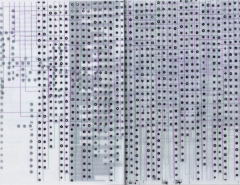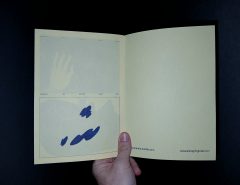Vía nettime.org, mailing-list bien entendida como ámbito de discusión donde se aprende bastante, recibo la estupenda noticia de que Geert Lovink acaba de publicar su libro «Zero Comments: Blogging and Critical Internet Culture». Y digo estupenda porque cuando iniciamos este blog (¡hará ya año y medio!) y comenzamos a documentarnos en el tema, los estudios sobre la blogosfera se dividían entre las referencias al periodismo participativo y las alusiones de emprendedores al marketing de la subjetividad en el mercado de la larga cola. De un tiempo a esta parte, han aparecido otros estudios y tentativas teóricas sobre el blog o sus efectos en la producción y crítica artísticas, como los de Juan Martín Prada, el blog como una cámara de las maravillas que recompone un discurso alegórico en una cotidianedad excesivamente literal, o José Luis Brea, el blog como escritura fragmentada y poliédrica capaz de agrietar el principio de verdad que, a modo de contaminación ilustrada, permanece en la crítica de arte, sus productores y lectores.
Sin duda, el libro de Geert parece pretender ser esa revisión exhaustiva de lugares comunes, tan usados y caducos ya que huelga citarlos una vez más, y proponer una sistematización del fenómeno y comunicación blog. Como quiera que el libro tardará unos días en llegar y no he podido hojearlo si quiera, os dejo con el propio Geert:
The book contains eleven essays and an introduction that deals with Web 2.0 and Internet culture after its recovery of 9/11 and the dotcom crash.
This is the table of content:
Introduction: Pride and Glory of Web 2.0
Blogging, the Nihilist Impulse
The Cool Obscure: Crisis of New Media Arts
Whereabouts of German Media Theory
Blogging & Building: The Netherlands After Digitization
Indifference of the Networked Presence: On Internet Time
Revisiting Sarai: Five Years of New Media Culture in India
ICT After Development: The Incommunicado Agenda
Updating Tactical Media: Strategies for Media Activism
Axioms of Free Cooperation: Contesting Online Collaboration
Theses on Distributed Aesthetics
Introducing Organized Networks: The Quest for Sustainable Concepts
And this is the original blurb that I wrote for the backcover:
In Zero Comments Geert Lovink upgrades worn-out concepts and inquires the latest Web 2.0 hype around blogs, wikis and social network sites.
In this third volume of his studies into critical Internet culture, Lovink develops a general theory of blogging. Unlike most publications he is not focusing on the dynamics between bloggers and the mainstream news media. Instead of celebrating citizen journalism blogs are analyzed in their nihilist impulse to empty out established meaning structures. Blogs bring on decay of the 20th century broadcast media, and are proud of their in-crowd aspect in which linking, tagging and ranking have become the main drivers.
The book also deals with the silent globalization of the Net in which no longer the West, but countries like India, China and Brazil are becoming main players in new media culture. It is not only the latest that Internet enthusiasts should focus on. Zero Comments upgrades concepts such as global Internet time, tactical media, the crisis of new media arts and the problematic relationship between architecture and the Net. The book ends with speculative notions on concepts such as organized networks, free cooperation and distributed aesthetics.
Zero Comments contains two large essays, the extended chapter on blogging and my take on new media arts. The book has made an interesting three years journey. I started working on it in Brisbane in July 2003, then took it to Amsterdam and finished at the Wissenschaftskolleg in Berlin. I closed the manuscript eleven months ago, early September 2006.
The book has won an honorable mention, the 2007 Ars Electronica Media Art Research Award, will come out this Fall in German (Transkript Verlag, Bielefeld) and in a shortened edition in Italian (with Bruno Mondadori). I am not sure yet if and where launches and presentations will be held.
For now I am excited to hold it in my hand and flip through the pages. Let the Infrastructure do its work?and then you can have a read. Thanks for everyone who supported me in the writing and enjoy!
With regards,
Geert



Deja una respuesta